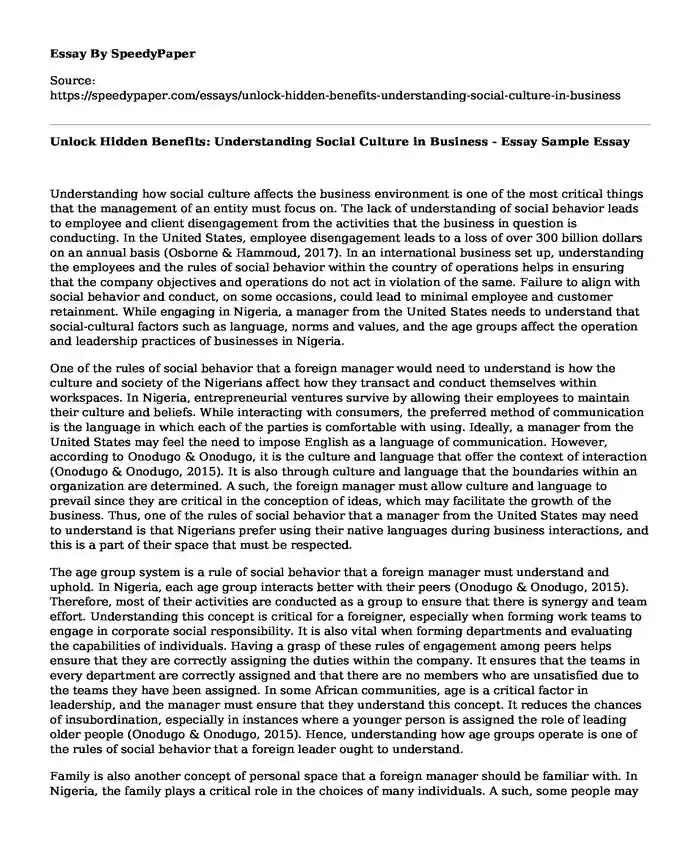
| Type of paper: | Essay |
| Categories: | Management Culture Business Sociology |
| Pages: | 4 |
| Wordcount: | 839 words |
Understanding how social culture affects the business environment is one of the most critical things that the management of an entity must focus on. The lack of understanding of social behavior leads to employee and client disengagement from the activities that the business in question is conducting. In the United States, employee disengagement leads to a loss of over 300 billion dollars on an annual basis (Osborne & Hammoud, 2017). In an international business set up, understanding the employees and the rules of social behavior within the country of operations helps in ensuring that the company objectives and operations do not act in violation of the same. Failure to align with social behavior and conduct, on some occasions, could lead to minimal employee and customer retainment. While engaging in Nigeria, a manager from the United States needs to understand that social-cultural factors such as language, norms and values, and the age groups affect the operation and leadership practices of businesses in Nigeria.
One of the rules of social behavior that a foreign manager would need to understand is how the culture and society of the Nigerians affect how they transact and conduct themselves within workspaces. In Nigeria, entrepreneurial ventures survive by allowing their employees to maintain their culture and beliefs. While interacting with consumers, the preferred method of communication is the language in which each of the parties is comfortable with using. Ideally, a manager from the United States may feel the need to impose English as a language of communication. However, according to Onodugo & Onodugo, it is the culture and language that offer the context of interaction (Onodugo & Onodugo, 2015). It is also through culture and language that the boundaries within an organization are determined. A such, the foreign manager must allow culture and language to prevail since they are critical in the conception of ideas, which may facilitate the growth of the business. Thus, one of the rules of social behavior that a manager from the United States may need to understand is that Nigerians prefer using their native languages during business interactions, and this is a part of their space that must be respected.
The age group system is a rule of social behavior that a foreign manager must understand and uphold. In Nigeria, each age group interacts better with their peers (Onodugo & Onodugo, 2015). Therefore, most of their activities are conducted as a group to ensure that there is synergy and team effort. Understanding this concept is critical for a foreigner, especially when forming work teams to engage in corporate social responsibility. It is also vital when forming departments and evaluating the capabilities of individuals. Having a grasp of these rules of engagement among peers helps ensure that they are correctly assigning the duties within the company. It ensures that the teams in every department are correctly assigned and that there are no members who are unsatisfied due to the teams they have been assigned. In some African communities, age is a critical factor in leadership, and the manager must ensure that they understand this concept. It reduces the chances of insubordination, especially in instances where a younger person is assigned the role of leading older people (Onodugo & Onodugo, 2015). Hence, understanding how age groups operate is one of the rules of social behavior that a foreign leader ought to understand.
Family is also another concept of personal space that a foreign manager should be familiar with. In Nigeria, the family plays a critical role in the choices of many individuals. A such, some people may find themselves in positions they want or do not want to exist in due to their families. The manager from the United States, therefore, must understand how every employee attained their position in the company. This way, they can offer support as per the needs and ambitions of the individual. Family is critical since it offers personal insight on what they want to do in the long-term, and that informs how they conduct themselves at work (Abdullahi & Zainol, 2016). It is, therefore, important for a manager to have a clear understanding of how much the families of their employees mean to them and their career aspirations.
In conclusion, a manager from the United States must understand how the culture and norms of Nigeria affect those in their teams. They must also appreciate the importance of language in the respective spaces since this is what facilitates communication and openness within the work area. Age groups are also a critical factor of personal space and social behavior, and they affect the nature of the assignments issued.
References
Abdullahi, A. I., & Zainol, F. A. (2016). The impact of socio-cultural business environment on entrepreneurial intention: A conceptual approach. International Journal of Academic Research in Business and Social Sciences, 6(2), 80-94.
Onodugo, V., & Onodugo, C. I. (2015). Impact of Socio-Cultural Factors on Entrepreneurial Development in Nigeria. African Educational Research Journal, 3(4), 246-254.
Osborne, S., & Hammoud, M. S. (2017). Effective employee engagement in the workplace. International Journal of Applied Management and Technology, 16(1), 4.
Cite this page
Unlock Hidden Benefits: Understanding Social Culture in Business - Essay Sample. (2023, Nov 30). Retrieved from http://land-repo.site.supplies/essays/unlock-hidden-benefits-understanding-social-culture-in-business?pname=speedypaper.com
Request Removal
If you are the original author of this essay and no longer wish to have it published on the SpeedyPaper website, please click below to request its removal:
- Paper Sample: Evaluation Proposal for the Social Awareness Program for Hispanics
- Living My Best Life - Free Essay about Punishments in Religion and Legally
- Essay Sample: Correctional Personnel and the Public Image of Corrections
- Essay Sample: Diversity Awareness in Healthcare
- Essay Sample on Religion and Medicine
- Corporate Social Responsibility in an Organization's Strategy - Paper Sample
- Innovative Leadership: Social, Systemic, and Heropreneurial Perspectives - Paper Sample
Popular categories




